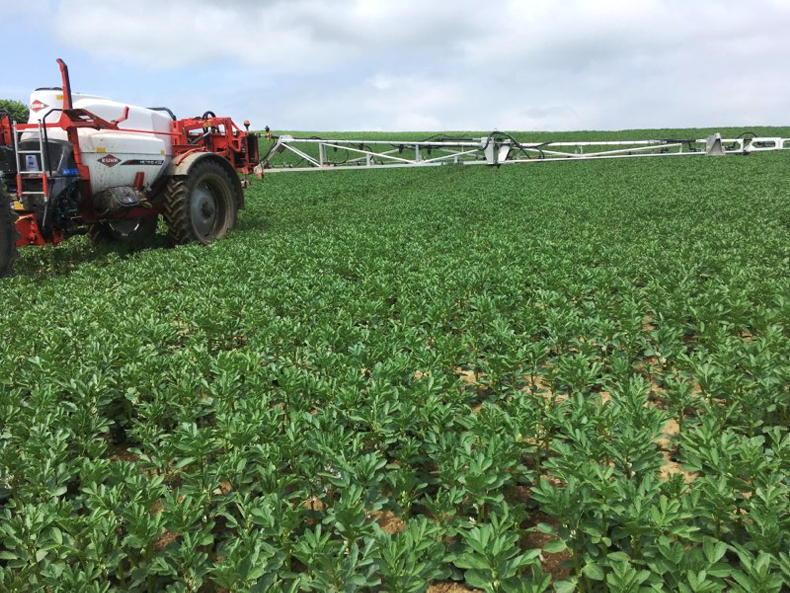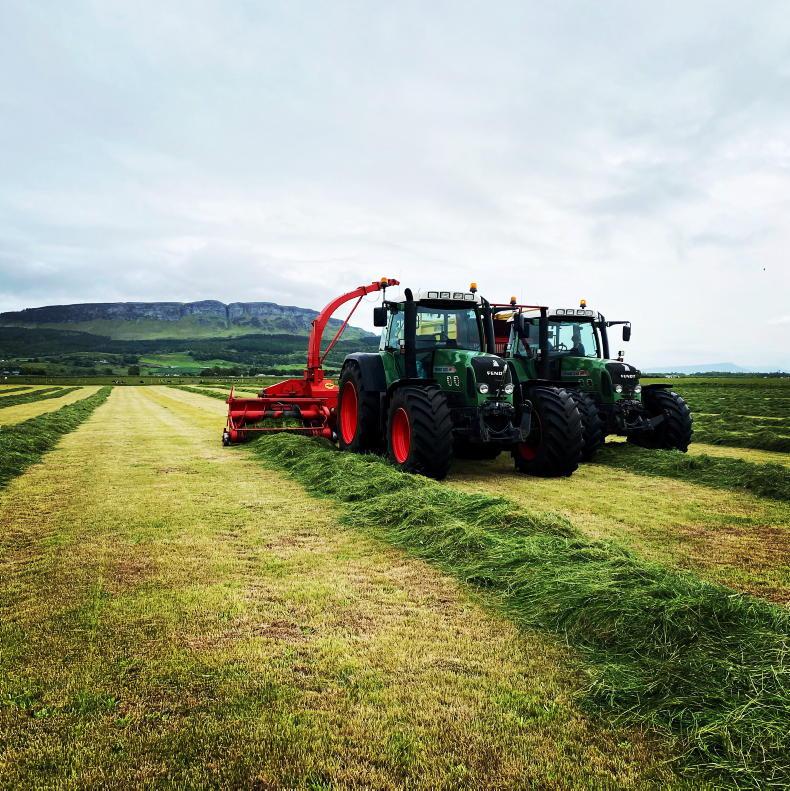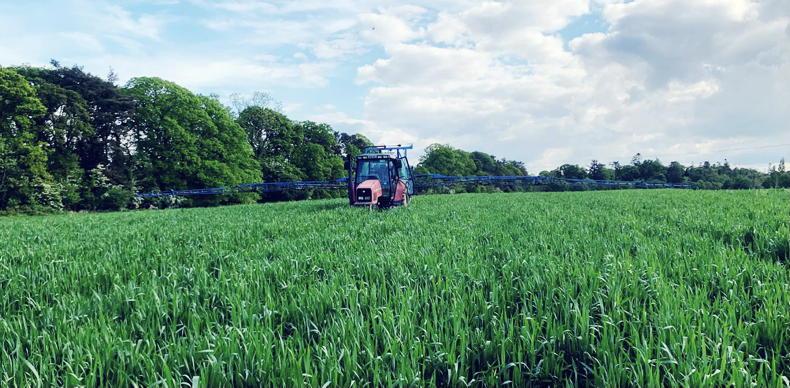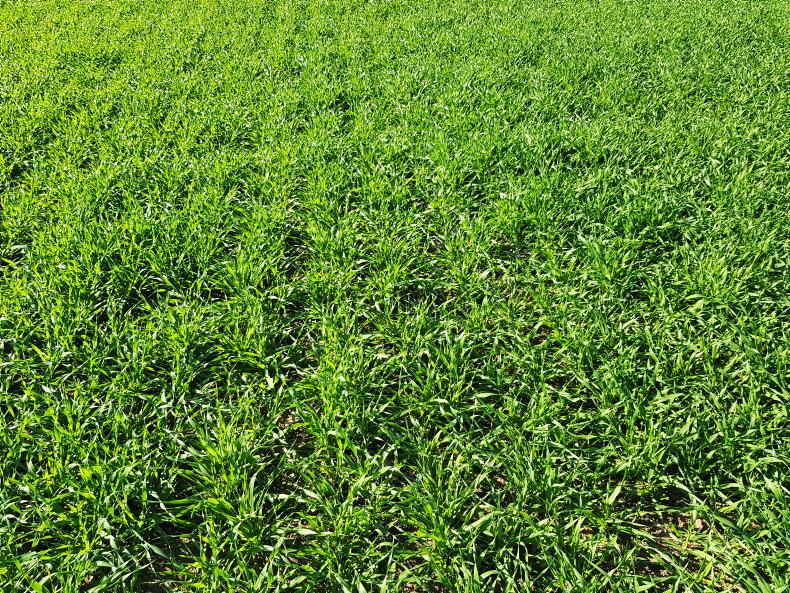
Soil moisture reserves are more than topped up now in Cork, says John.
Since talking to him last month, around 121mm of rain has fallen. However, it was only when temperatures increased over the past week that crops began to move.
He has been lucky with spraying this year as, despite the broken weather, most of his applications have been on time. In general, he says his crops have good potential this year.
John’s winter barley crops received a head spray on either 22 or 26 May consisting of Venture Extra (0.65l/ha) and Priaxor (0.65l/ha).

John applying Signum on to his spring beans this week.
His winter wheat crops have responded well to the better weather and the flag leaf is now fully out. Disease pressure in the upper canopy is minimal. John held off drilling the crop until 15 October which he thinks has helped reduce the disease pressure. Last week the crops received a T2 of Adexar (1.5l/ha). His winter oats are also looking very good and received a head spray last week of Elatus Era (0.8l/ha).
Spring crops
John says his spring barley crops are looking good but he has noted some yellowing on the headlands. On 13 May they received a weed spray of Calibre Max (92g/ha) and Hurler (0.75l/ha) along with Mancozen (1l/ha) and the insecticide Stealth (50ml/ha). The crops received their T1 this week of Coyote (0.66l/ha) and a follow-up herbicide of Axial Pro (0.5l/ha).
His spring beans are around knee height and are due to receive Signum at 0.7l/ha this week. He is happy with the crop and hasn’t seen any notching so far. He won’t be applying an insecticide this year.
The crop has taken off over the past week and seems to be “growing an inch a day”. This is John’s first time growing spring beans and he believes their inclusion will benefit his rotation. He has opted to chop around 90ac of straw this year but will still be able to supply all of his customers.

Ground conditions are excellent in Derry, says Jonathan, who was just about to start lifting silage when the Irish Farmers Journal spoke to him this week. He has around 80ac to harvest, all of which is harvested by the Kellys themselves into the pit.
It had been cool until last week so growth has been slow, but things have turned around this week.
With that said, his farm has received a lot of sunshine over the past month meaning his maize crops, which were sown under plastic, are doing well.
The crop will be through the plastic shortly. Unlike last year, none of his plastic blew off and weed control has been reasonably good.

Jonathan made a start to silage 2021 this week.
Jonathan is very happy with all of his cereal crops this year. His hybrid winter rye stands at over 1.5m in height and is looking well. The crop will likely be harvested around the end of July. His winter barley is one of the best crops he has had so far. He reduced his PGR programme by one spray this year and questions if this has made the difference.
His winter wheat crops are dark green and recently received a T2 of Univog (1.25l/ha) and EPSO Combitop (5kg/ha). He is happy with the crops and the upper canopy remains clean.
However, Jonathon thinks some of the lower leaves were damaged by frost earlier in the month.
His winter oilseed rape crop is at various stages, from still in flower to petals fully off. He has yet to decide if it needs a fungicide.
Spring barley
Johnathan’s spring barley crops are coming along well and received Jet (2l/ha), Barleyquat (1.25l/ha) and Magphos (2l/ha) last week. He intends to apply the herbicide Zypar this week but there is no need to add an aphicide into the tank.
His crop of spring beans has really come on with the help of heat and moisture. This is Jonathan’s first year growing the crop and he thinks it has reasonable potential.

The weather has been mixed in Kilgraigue since talking to Norman last.
Cooler weather resulted in slow crop growth for most of May. However, warmer weather over the past week has made a big difference.
Norman feels there is good potential in all of his crops this year. He recently applied a head spray of Elatus Plus (0.5l/ha) and Trinity (0.5l/ha) on his winter barley. He followed up with an application of Final K (4.5kg/ha) shortly after, along with seaweed extract and fulvic acid.
His three-way winter wheat mix is coming along well and recently received its T2 fungicide of Peacoq (1.6l/ha) and Pecari (0.8l/ha). He also added in a pre-made nutrient mix of seaweed extract (1l/ha), humic acid (1l/ha), fulvic acid (120g/ha), molasses (2l/ha), melted urea (8.7kg N/ha), magsulfate (4kg/ha), mag nitrate (3kg/ha) and multivitamin mix (400ml/ha). He didn’t apply a fungicide but instead applied Phospite (2l/ha) and Optiplant (1.5l/ha) along with the above pre-made mix to one of his wheat crops. He intends to test leaves for the presence of disease next year to help determine if a fungicide is needed or not.

Norman applying a T2 spray to his winter wheat crop.
Weed pressure
Norman had to apply a weed spray to his spring oat and barley combi crops due to high weed pressure. The Budda and Zypar herbicide mix knocked out the weeds but also took out his pea companion crop. All spring crops have now been brought to 125kg N/ha and, with the exception of some yellowing on headlands, are looking well. His spring barley crops are between GS23 and GS25 and he questions if they need a PGR as they are very thick. He had to apply Axial Pro in some of his spring wheat crops to knock out volunteer oats. All spring crops will be due a mix of minor and major nutrients over the coming week. His spring beans will also be due a fungicide application of Signum this week and are looking good.
Norman plans to chop straw this year under the Straw Incorporation Measure but may have to adjust his planned area, he says.


Soil moisture reserves are more than topped up now in Cork, says John.
Since talking to him last month, around 121mm of rain has fallen. However, it was only when temperatures increased over the past week that crops began to move.
He has been lucky with spraying this year as, despite the broken weather, most of his applications have been on time. In general, he says his crops have good potential this year.
John’s winter barley crops received a head spray on either 22 or 26 May consisting of Venture Extra (0.65l/ha) and Priaxor (0.65l/ha).

John applying Signum on to his spring beans this week.
His winter wheat crops have responded well to the better weather and the flag leaf is now fully out. Disease pressure in the upper canopy is minimal. John held off drilling the crop until 15 October which he thinks has helped reduce the disease pressure. Last week the crops received a T2 of Adexar (1.5l/ha). His winter oats are also looking very good and received a head spray last week of Elatus Era (0.8l/ha).
Spring crops
John says his spring barley crops are looking good but he has noted some yellowing on the headlands. On 13 May they received a weed spray of Calibre Max (92g/ha) and Hurler (0.75l/ha) along with Mancozen (1l/ha) and the insecticide Stealth (50ml/ha). The crops received their T1 this week of Coyote (0.66l/ha) and a follow-up herbicide of Axial Pro (0.5l/ha).
His spring beans are around knee height and are due to receive Signum at 0.7l/ha this week. He is happy with the crop and hasn’t seen any notching so far. He won’t be applying an insecticide this year.
The crop has taken off over the past week and seems to be “growing an inch a day”. This is John’s first time growing spring beans and he believes their inclusion will benefit his rotation. He has opted to chop around 90ac of straw this year but will still be able to supply all of his customers.

Ground conditions are excellent in Derry, says Jonathan, who was just about to start lifting silage when the Irish Farmers Journal spoke to him this week. He has around 80ac to harvest, all of which is harvested by the Kellys themselves into the pit.
It had been cool until last week so growth has been slow, but things have turned around this week.
With that said, his farm has received a lot of sunshine over the past month meaning his maize crops, which were sown under plastic, are doing well.
The crop will be through the plastic shortly. Unlike last year, none of his plastic blew off and weed control has been reasonably good.

Jonathan made a start to silage 2021 this week.
Jonathan is very happy with all of his cereal crops this year. His hybrid winter rye stands at over 1.5m in height and is looking well. The crop will likely be harvested around the end of July. His winter barley is one of the best crops he has had so far. He reduced his PGR programme by one spray this year and questions if this has made the difference.
His winter wheat crops are dark green and recently received a T2 of Univog (1.25l/ha) and EPSO Combitop (5kg/ha). He is happy with the crops and the upper canopy remains clean.
However, Jonathon thinks some of the lower leaves were damaged by frost earlier in the month.
His winter oilseed rape crop is at various stages, from still in flower to petals fully off. He has yet to decide if it needs a fungicide.
Spring barley
Johnathan’s spring barley crops are coming along well and received Jet (2l/ha), Barleyquat (1.25l/ha) and Magphos (2l/ha) last week. He intends to apply the herbicide Zypar this week but there is no need to add an aphicide into the tank.
His crop of spring beans has really come on with the help of heat and moisture. This is Jonathan’s first year growing the crop and he thinks it has reasonable potential.

The weather has been mixed in Kilgraigue since talking to Norman last.
Cooler weather resulted in slow crop growth for most of May. However, warmer weather over the past week has made a big difference.
Norman feels there is good potential in all of his crops this year. He recently applied a head spray of Elatus Plus (0.5l/ha) and Trinity (0.5l/ha) on his winter barley. He followed up with an application of Final K (4.5kg/ha) shortly after, along with seaweed extract and fulvic acid.
His three-way winter wheat mix is coming along well and recently received its T2 fungicide of Peacoq (1.6l/ha) and Pecari (0.8l/ha). He also added in a pre-made nutrient mix of seaweed extract (1l/ha), humic acid (1l/ha), fulvic acid (120g/ha), molasses (2l/ha), melted urea (8.7kg N/ha), magsulfate (4kg/ha), mag nitrate (3kg/ha) and multivitamin mix (400ml/ha). He didn’t apply a fungicide but instead applied Phospite (2l/ha) and Optiplant (1.5l/ha) along with the above pre-made mix to one of his wheat crops. He intends to test leaves for the presence of disease next year to help determine if a fungicide is needed or not.

Norman applying a T2 spray to his winter wheat crop.
Weed pressure
Norman had to apply a weed spray to his spring oat and barley combi crops due to high weed pressure. The Budda and Zypar herbicide mix knocked out the weeds but also took out his pea companion crop. All spring crops have now been brought to 125kg N/ha and, with the exception of some yellowing on headlands, are looking well. His spring barley crops are between GS23 and GS25 and he questions if they need a PGR as they are very thick. He had to apply Axial Pro in some of his spring wheat crops to knock out volunteer oats. All spring crops will be due a mix of minor and major nutrients over the coming week. His spring beans will also be due a fungicide application of Signum this week and are looking good.
Norman plans to chop straw this year under the Straw Incorporation Measure but may have to adjust his planned area, he says.














 This is a subscriber-only article
This is a subscriber-only article










SHARING OPTIONS: